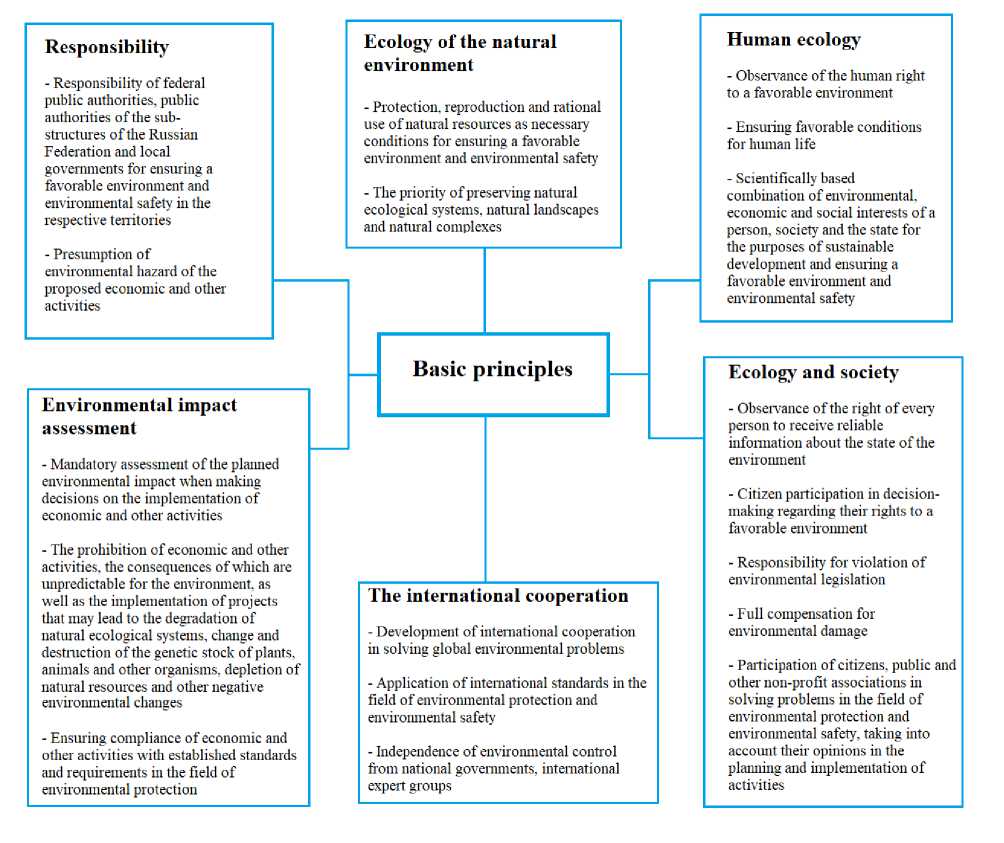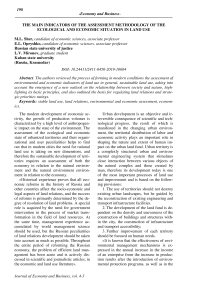The main indicators of the assessment methodology of the ecological and economic situation in land use
Автор: Sher M.L., Opryshko E.L., Mironov L.V.
Журнал: Экономика и бизнес: теория и практика @economyandbusiness
Статья в выпуске: 4-3 (50), 2019 года.
Бесплатный доступ
The authors reviewed the process of forming in modern conditions the assessment of environmental and economic indicators of land use in general, sustainable land use, taking into account the emergence of a new outlook on the relationship between society and nature, highlighting its basic principles, and also outlined the basis for regulating land relations and strategic priorities ratings.
Stable land use, land relations, environmental and economic assessment, economics
Короткий адрес: https://sciup.org/170189920
IDR: 170189920 | DOI: 10.24411/2411-0450-2019-10604
Текст научной статьи The main indicators of the assessment methodology of the ecological and economic situation in land use
The modern development of economic activity, the growth of production volumes is characterized by a high level of anthropogenic impact on the state of the environment. The assessment of the ecological and economic state of urbanized territories and their organizational and user peculiarities helps to find out that in modern cities the need for rational land use is taking on new dimensions, and therefore the sustainable development of territories requires an assessment of both the economy in relation to the natural environment and the natural environment environment in relation to the economy.
«Historical experience proves that all economic reforms in the history of Russia and other countries affect the socio-economic and legal aspects of land relations, and the success of reforms is primarily determined by the degree of resolution of land problems. A special role is acquired by the need for government intervention in the process of market transformation in the field of land resources. At the same time, management experience accumulated by world management science should be used, but the Russian peculiarities of land relations development should be taken into account as much as possible. Throughout the entire period of reforming the Russian economy, the problem of efficient land management has been acute and is actively discussed in scientific and journalistic articles, in the economic and land use literature».
Urban development is an objective and irreversible consequence of scientific and technological progress, the result of which is manifested in the changing urban environment, the territorial distribution of labor and economic activity plays an important role in shaping the nature and extent of human impact on the urban land fund. Urban territory is a complexly structured urban and environmental engineering system that stimulates close interaction between various objects of the natural complex and those created by man, therefore its development today is one of the most important processes of land use and improvement and is based on the following provisions:
-
1. The use of territories should not destroy existing urban landscapes, but be guided by the reconstruction of existing engineering and transport infrastructure facilities.
-
2. The development of the land fund is dependent on the density and unevenness of the construction of buildings and structures within the city, the construction of infrastructure and transport accessibility;
-
3. Further improvement of each territory should be focused on human needs.
«It is known that the effectiveness of environmental management mechanisms is expressed in the annual increase in the income of an enterprise from the increase in production results after the introduction of environmental protection programs, as well as in the amount of preventable damage. At the same time, the assessment of preventable damage is carried out by many enterprises, taking into account the ecological significance of the natural area, as well as the results of a comparison of the basic damage standards and the actual impact of the enterprise’s activities on the ecological situation» [7].
It is impossible to get away from the problems of the current situation without revising the principles of ecological-economic relations and the causes of unfavorable tendencies in the sphere of land use that have been formed by the present day. «It is necessary to study the existing methods for assessing the ecological and economic condition of urban areas, taking into account the analysis of the causes of irrational environmental management, since the objective prerequisites for the formation of criteria for the integrated assessment of urban areas are an integral part of the development of a sustainable environmental management system that allows for an environmentally stable state of these territo-ries» [10].
To date, there is no balanced ecological-economic mechanism for regulating land use based on backward ecological relations and at the same time harmonizing the economic interests of a multi-structured land use. The policy of ecologically-balanced development of the territory of the regions, implemented in the framework of the «Fundamentals of the state policy in the field of environmental development of the Russian Federation for the period up to 2030» [11], approved by the President of the Russian Federation on April 30, 2012 and a number of legal documents: Decree of the President of the Russian Federation of April 19, 2017 No. 176 "On the Strategy of the Environmental Security of the Russian Federation for the period until 2025" [1], Order of the Government of the Russian Federation of 31.08.2002 N 1225-p "On the Ecological Doctrine of the Russian Federation" [2] should become such a mechanism.
Pictures 1 and 2 show the strategies for the development of the state policy in the field of the environmental development of Russia for the period up to 2030 and describe the basic principles.

Pic. 1. Fundamentals of state policy in the field of environmental development of Russia for the period until 2030
If the functioning of the economy of the territories is based on ecological purity, the higher the environmental sustainability of the territorial economic system. «The theoretical substantiation of the integrated environmental management and the tools that regulate the process of reproduction of natural resources and the preservation of the quality of the environment as factors of economic growth are particularly relevant in connection with the transfer of the solution of many problems of efficient management from the macro to the meso and micro levels» [9].
«Repeated attempts to ensure the dynamic equilibrium of the macrosystem, relying on well-known principles and models of market transformation in Russian reality, exacerbated the contradictions of social production in the effective circulation of natural resources due to their large-scale use and anthropogenic impact on the natural environment» [6].

Pic. 2. Basic principles of the basis of state policy in the field of environmental development of Russia for the period up to 2030
The development of land relations in each country has its own characteristics, due to historical, political and economic differences, however, there are some general patterns for all countries of the same socio-economic level.
«At the present stage of development of the market economy, further substantiation of the theoretical aspects of land management and the development of practical activities in the field of improving land relations are necessary. There are two approaches to the formation of state land management - administrative and economic. The administrative approach involves land zoning, planning, regulation of their use and land acquisition based on the legislation of the country. The sale or other transfer of agricultural land for non-agricultural purposes almost everywhere re- quires a special permit. The economic approach involves attracting financial and economic instruments to land management – taxation, mortgage, land mortgage, various types of subsidies» [5].
«Regulation of integrated environmental management in the regions should proceed from the concept, principles and methods of its implementation from the standpoint of new knowledge of ecology, a fundamentally different model of the nature management process itself, reflecting changes in views on the nature of wealth, values, on the idea of the place and role of environmental management in socio-economic development of regions and livelihoods of people» [4].
Adaptation of the existing economic activity to new conditions does not pass instantly, and it actualizes the need to assess the ecolog- ical and economic state and the potential for sustainable economic growth. Within this framework, it is necessary to implement a full-fledged complex of measures, providing a comprehensive analysis of all types of resources available for economic activity, capable of combining all assessments into a sin- gle, integrated system of actions that will allow making the right choice of development directions and optimizing them, based on the greatest favorableness for the economy social sphere and the state of the environment, as well as solving the tasks of environmental protection and strategic development.
Список литературы The main indicators of the assessment methodology of the ecological and economic situation in land use
- Указ Президента РФ от 19.04.2017 N 176 "О Стратегии экологической безопасности Российской Федерации на период до 2025 года". http://www.consultant.ru/document/cons_doc_LAW_215668/.
- Распоряжение Правительства РФ от 31.08.2002 N 1225-р . http://www.consultant.ru/document/cons_doc_LAW_92097/.
- "Основы государственной политики в области экологического развития Российской Федерации на период до 2030 года" (утв. Президентом РФ 30.04.2012). http://www.consultant.ru/document/cons_doc_LAW_129117/.
- Аксёнова Е.Г. Автореферат диссертации по теме "Комплексная эколого-экономическая оценка состояния городских территорий в целях обеспечения устойчивой системы природопользования". Ростов-на-Дону. 2013. http://economy-lib.com/kompleksnaya-ekologo-ekonomicheskaya-otsenka-sostoyaniya-gorodskih-territoriy-v-tselyah-obespecheniya-ustoychivoy-sistemy#ixzz5WdZ2t1Ux.
- Шер М.Л. Земельная политика Российской Федерации: состояние, проблемы и пути реализации // В сборнике: Актуальные проблемы устойчивого экономического развития Российской Федерации Материалы Всероссийской научно-практической конференции. Сборник статей. Ответственный редактор Д.В. Дудни. 2017. С. 60-65.


